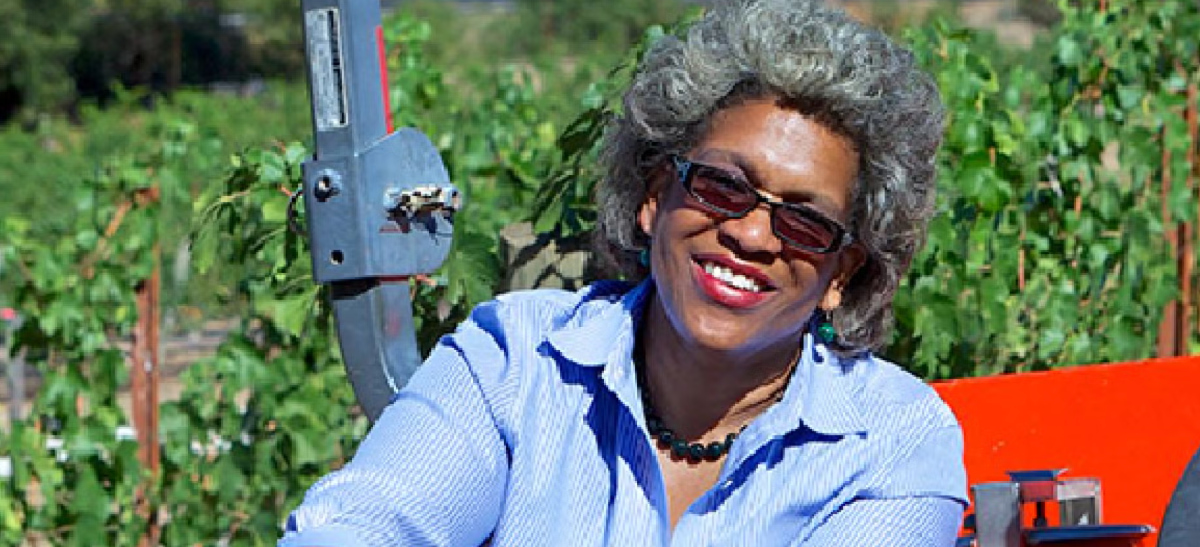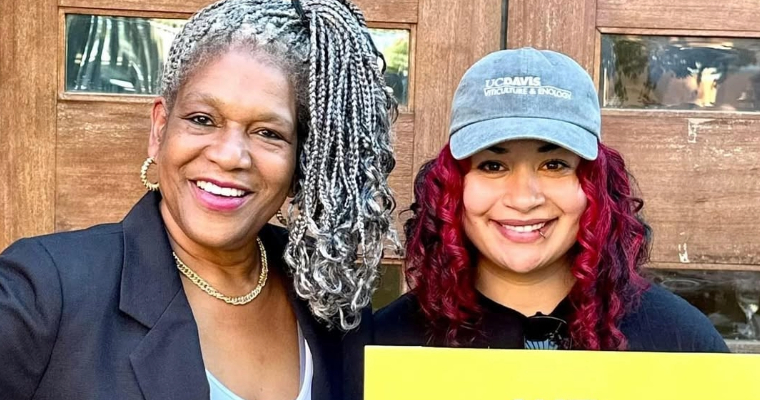Early Bird
Deadline
January 31, 2026
Judging
Date
May 18, 2026
Winners
Announced
June 10, 2026

Theodora Lee, known as Theo-patra, Queen of the Vineyards, has made a remarkable journey from a successful trial lawyer to a renowned winemaker and vineyard owner. In 2003, she founded Theopolis Vineyards in Mendocino County's Yorkville Highlands, a region celebrated for its natural beauty and ideal growing conditions. Despite her initial lack of interest in wine, a serendipitous move to California ignited her passion, leading to years of learning and ultimately producing award-winning wines. Today, Theopolis Vineyards stands as a testament to Theodora's dedication to quality, sustainability, and innovation in winemaking. Read on as Theodora shares her journey, challenges, and insights from the world of winemaking with the Sommeliers Choice Awards.
I moved to California from Texas in the 1980s, where I was introduced to fine wine by my law firm mentors. Before that, I had little interest in wine, as my first experience was with my dad’s homemade Muscadine wine, which I didn’t enjoy. In California, I began to appreciate fine wines during dinner with my mentors and while walking through vineyards. Growing up on a cattle ranch, I developed a love for farming, and the idea of owning a vineyard became my dream. I took viticulture classes at UC Davis to prepare for the transition into winemaking.
Unable to afford land in Napa or Sonoma, I bought 20 acres in Mendocino County in 2001. After extensive land preparation, I planted 5 acres of Petite Sirah in 2003 and established Theopolis Vineyards. I focused on vineyard management, working closely with my vineyard manager to ensure the best quality grapes. Initially, I sold my grapes to other wineries, earning praise from wine critic Robert Parker. In 2012, after a rainstorm forced me to harvest early, I couldn’t sell my grapes. I decided to have them custom-crushed and bartered with a winemaker to produce the wine. My 2012 Petite Sirah won a gold medal from Sunset Magazine, and Theopolis Vineyards began its winemaking journey, consistently earning high ratings and awards since then.

Image: Theodora Lee aka Theo-Patra, Queen Of The Vineyards
One of the key resources that influenced my winemaking journey was the book The Grapevine: From the Science to the Practice of Growing Vines for Wine. While I took courses in viticulture and enology at the University of California, Davis, to learn about growing grapes and making wine, this book provided invaluable insights and practical knowledge that further enhanced my understanding of the craft.
Also read: Crafting Stories in Every Sip: Jonathan Kleeman’s Vision for Butcher Private
A truly memorable moment in my winemaking career is the joy of seeing consumers appreciate and enjoy our wines. I take great pride when people post about our wines, write wine blogs, or promote our brand. I’m also incredibly proud of the numerous awards our wines have received, particularly our Estate Grown Petite Sirah, which has earned Best in Class, Double Gold, and 96 Points. The 2018 Estate Grown Petite Sirah was ranked No. 16 in Wine Enthusiast’s Top 100 Cellar Selections of 2021. One of the highlights for me was when Sunny Hostin, co-host of The View, featured Theopolis Vineyards as one of her favorite wines in the 2023 Mother’s Day edition of Co-Hosts' Favorite Things. Additionally, being recognized as a Wine Industry Leader by Wine Business Monthly and nominated as Person of the Year at Wine Enthusiast’s 22nd Annual Wine Star Awards were significant milestones in my career.
[[relatedPurchasesItems-61]]
The Yorkville Highlands of Anderson Valley, where Theopolis Vineyards is located, is a truly unique and inspiring wine-growing region. I’m captivated by its natural beauty, with sheep and orchards still gracing the landscape. Our region is home to small, family-owned, and handcrafted wineries, and we are proud to be part of the greenest AVA in California. In fact, Mendocino was recently named Wine Enthusiast’s 2024 American Wine Region of the Year. At Theopolis Vineyards, we firmly believe that great wine begins in the vineyard. We hand-pick our grapes to ensure the highest quality wine for our consumers. Our minimalist approach to winemaking allows the fruit to develop naturally, with the yeast and grape juice creating their own spectacular results. For our red wines, we bottle unfiltered and unfined, following the European tradition. This approach highlights the true character of our vineyard and growing region in every bottle.
I believe that a successful winemaker must possess a profound understanding of viticulture and grape cultivation, as the origin of great wine lies in the vineyard. Physical strength is also essential for tasks such as harvesting, crushing, fermenting, pressing, racking, blending, and bottling the wine. Patience is key, as the winemaking process requires time and care. Additionally, a great winemaker must be skilled in operating and maintaining winemaking equipment, keeping detailed records, and closely monitoring temperature and oxygen levels throughout the process.
Also read: Innovating Napa: How Cecil Park is Redefining Winemaking
I take great pride in creating opportunities for young people interested in viticulture and enology. That’s why I established the Theopolis Vineyards Diversity Fund at the University of California, Davis, where I’ve contributed $70,000 to date. The fund provides an annual award of up to $10,000 to a student interested in viticulture, enology, vineyard management, or viticulture research. Preference is given to students underrepresented in the field or those with life experiences that help them understand the barriers facing these populations.
Unfortunately, racism is present in every sector of society, and the wine industry is no exception. It remains a male-dominated industry, which has made it challenging to find distributors and get my wines into high-end restaurants and wine bars. However, as a lawyer, I’ve been fortunate to overcome some of these challenges with the help of my law firm partners, who have introduced me to restaurant and bar owners. Those connections have been invaluable in helping me break through those barriers. Today, I’m proud to say our wines are carried in some of the finest restaurants in the San Francisco Bay Area.
I firmly believe in hard work and persistence. Despite consistently receiving rejection from distributors—even after producing award-winning wines—I never give up. Recently, one distributor questioned the marketability of one of my varietals, but I continue to push forward, determined to make progress and succeed.

Image: Theodora Lee at UC Davis: Department of Viticulture and Enology Welcome Back BBQ
We honor tradition by bottling our red wines unfiltered and unfined, staying true to classic winemaking methods. For example, with our Pinot Noir, we aim for a light to medium-bodied, fruit-forward style that is dry and delicious. Our goal is to balance the delicate fruit quality of the vineyard with a soft, supportive structure that highlights the unique terroir of the Yorkville Highlands. At the same time, we embrace innovation by using sustainable agricultural practices in our vineyards, ensuring that we stay at the forefront of both tradition and modern advancements in winemaking.
In recent years, I’ve had the opportunity to serve as a wine host aboard AmaWaterways Wine Cruises in Europe, where I give lectures on regional wines and the differences between Old World and New World styles. This experience has deepened my understanding of wines from the Rhône Valley, including my own Estate Grown Petite Sirah. I’ve also been exploring the contrasts between Old World Pinots from Burgundy and New World Pinots from regions like Santa Lucia Highlands and Yorkville Highlands. Through this, I've gained valuable insights into terroir. This summer, I hosted the Melodies of the Danube cruise, learning about Hungarian, Austrian, German, and Czech wines. Up next, I’ll be hosting the Taste of Bordeaux cruise, where I look forward to learning more about Bordeaux’s wines and regions.
Sustainability is at the core of our approach, both in the vineyard and the cellar. In the vineyard, we prioritize sustainable practices like water conservation and the use of cover crops. In the cellar, we take a minimalist approach to winemaking, allowing the fruit to develop naturally with minimal intervention, letting the yeast and grape juice create their own exceptional results. This approach highlights the unique characteristics of our vineyard and growing region, ensuring that sustainability guides every step of the winemaking process, from grape to bottle.
One important lesson I've learned is that grape farming is heavily reliant on Mother Nature, and patience is key. It took me years to fully appreciate this. Additionally, selling wine once it’s bottled is a challenging task that requires a tremendous amount of hard work and persistence.
Header image sourced from UC Davis Foundation
Related Links
Reimagining Wine with Sarah Hoffman: How Maker Wine is Revolutionizing the Canned Wine Market
Condado Portucalense: A Legacy of Innovation and Excellence in the Lisbon Wine Region
Enter your Wines now and get in front of top Sommeliers, Wine Directors, and On-Premise Wine Buyers of USA.
